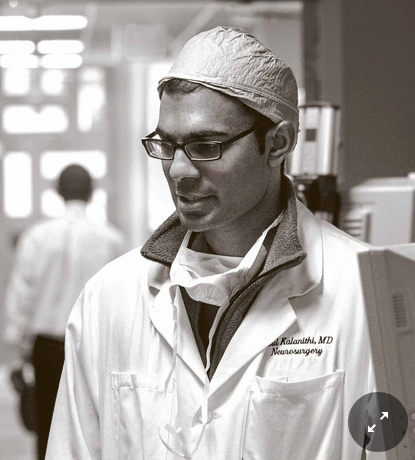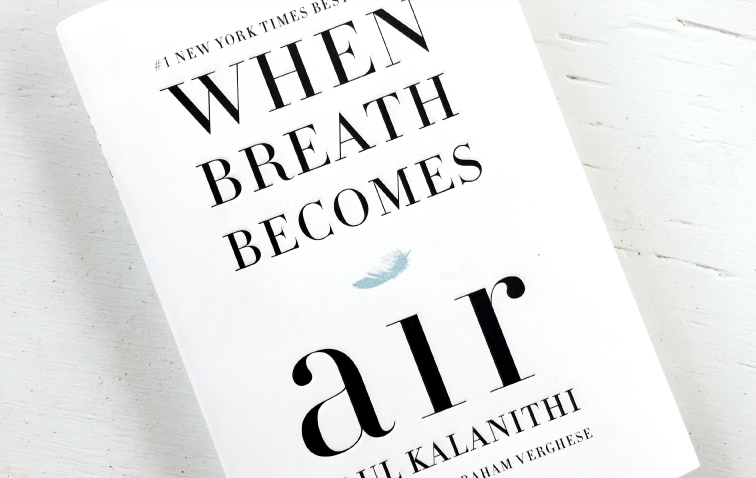“What do you say to the God of Death: NOT TODAY!” If only it was true in real life.
I’ll be honest, at first, I didn’t want to read this book at all because I felt it might get too heavy for the heart. But in second thought I wanted to give this book a shot. Once I did; I could hardly put it down and as expected, I was in tears a couple of times. Anybody who has ever picked this book is bound to leave it with a lump in his heart, for it is one tough and affecting read. It will unsettle.
It is stated in the very beginning of the book that the person in question: Paul Kalanithi, who is a neurosurgeon by profession, is diagnosed with stage IV metastatic lung cancer at the age of 36. Paul is about to graduate residency with plans to start a family with wife Lucy and job offers from reputed universities; the diagnosis comes as a cruel blow at what should have been a high point in his life, the beginning of what surely would have been an incredible journey. The diagnosis may have changed his plans about his future and his family, but it never stopped him from doing his best in his last months. His take on life is infectious when he says, “Even if I’m dying, until I actually die, I’m still living.”
The first part of the book is a thorough narrative of Dr. Kalanithi ‘s upbringing as the child of hardworking Indian immigrant parents and his undying love for medicine and literature. He speaks so dearly of his relationship with his best half Lucy Kalanithi – whom he met in a medical school and who he credits full score in supporting him through everything he went through. He grew up a glorious career, studying biology and literature at Stanford, then history and philosophy of medicine at Cambridge, and finally neurosurgery at Yale.
The second part of the book is rather a devastating account on the tide of disease and the death that follows. Paul is brutally open in communicating his disbelief, his tears, his hope and his understanding of his fatal disease. There are heart-wrenching descriptions of how at one point the cancer seemed to have almost disappeared and how, after Dr. Kalanithi had again cautiously made plans for a hopeful future with his wife, it returned with a vengeance and he had to finally give up his promising career. There is no bluster in the story; as he says, the tumor was what it was and you simply experienced the feelings it brought to your mind and heart.
What makes the book so valuable is the fact that the author, not even for a second is pleading for a mercy or sympathy from any corner. He is, in fact embracing his end with all the precision, sensibility and courage one could think of. There’s an infusion of wise acceptance, hope and a tenacious desire to live, work and love normally. Death is one of the greatest mysteries of human life, that Kalanithi explored in both his career as a neurosurgeon and as a patient battling cancer.

Despite the disease- Dr. Kalanithi tries very hard – and succeeds admirably – to live a normal life. He ensures to spend quality time with what mattered to him the most: his family and with the blank white pages, filling which would eventually put his restless soul to some peace. It is also in this uncertain moment of his life, when he decides to go for the unexpected; welcome a new life to the world with his exemplary wife Lucy, whose epilogue of the book is almost as eloquent and soul-stirring as his own writing.
Lucy fills in the epilogue when Paul leaves us in the middle of what can be best termed as his ‘extraordinary’ journey. Lucy’s description of Paul’s final months reveals how Paul takes advantage of his present and searches for a purpose after he can no longer perform surgery. He becomes focused on the two things that preserve his legacy: caring and watching for his daughter whom he could only know for eight months, and ensuring that he will become a writer, as he had always hoped. She rightly urges how this is not some simple tale of a man who somehow “beats” a disease by refusing to give up.
In a nutshell, my opinion is that you read this book at least once in your lifetime! Yes, it’s devastating and heartbreaking; but it’s also inspiring and real.
